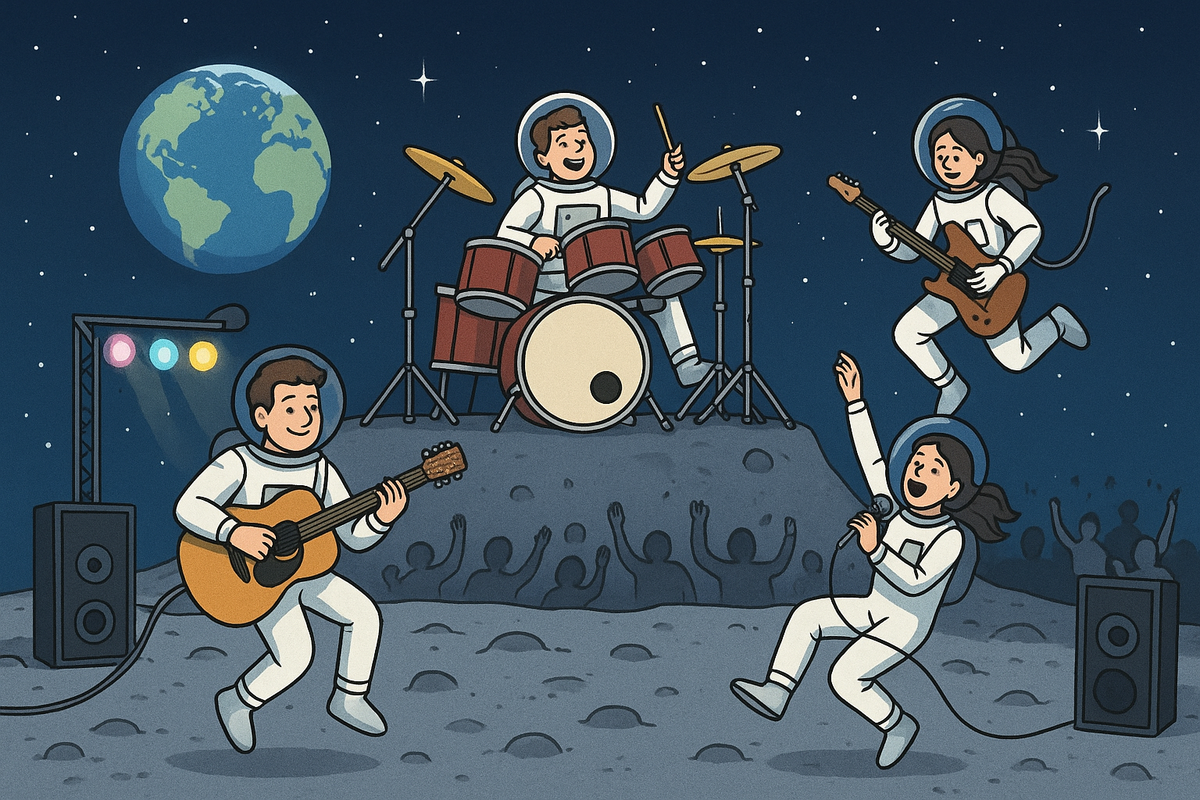Would Music Sound Different on the Moon? – Concerts in Zero Gravity

Music is one of the most universal human experiences. It transcends borders, cultures, and even languages. But here’s a fun question: would music sound the same if you were listening to it on the Moon? And while we’re at it, could we ever host concerts in zero gravity?
This is not just a thought experiment for science fiction fans—it’s also a fascinating dive into physics, acoustics, and imagination. Let’s explore how the lunar environment, the absence of atmosphere, and zero-gravity conditions could change the way we experience music.
Why Sound Works Differently on the Moon
On Earth, sound travels through air as vibrations of molecules. When a guitar string vibrates, the air around it vibrates too, and those vibrations eventually reach your eardrums. But the Moon has no atmosphere—no air, no molecules bumping into each other—so sound can’t travel in open space there.
That means if you took your guitar out of a lunar base and strummed it under the stars, nothing would happen. Not even the faintest twang. The silence would be absolute—eerily absolute. Astronauts have described how the Moon is hauntingly quiet, and this silence isn’t poetic exaggeration. It’s physics.
Inside a lunar base, however, things change. With a controlled atmosphere (oxygen, nitrogen, pressure), sound waves could travel just as they do on Earth. But even then, they’d be subtly different. Why? Because the density of air, humidity, and pressure all affect how sound waves move.
Fun fact: On Earth, sound travels faster in helium than in normal air, which is why your voice sounds “chipmunk-like” when you inhale it (not recommended). If the Moon base air mixture were slightly different than Earth’s, every note might shift in pitch and timbre. Your favorite song could sound ever-so-slightly alien.
What About Zero Gravity Concerts?
Zero gravity doesn’t stop sound waves, but it does change how instruments and performers behave. Imagine a drummer trying to hit the snare drum while floating away from it. Or a singer trying to project their voice when their body is flipping upside down.
In zero gravity:
- Instruments float. Musicians would need straps, magnetic boots, or Velcro to keep everything in place. A flying saxophone could be funny until it knocks someone out.
- Breathing changes. Singers might find their diaphragmatic control harder to manage, since breathing mechanics rely partly on gravity. Sustaining long notes could become more difficult—or maybe singers would evolve new techniques.
- Audience chaos. A mosh pit in zero gravity would look more like slow-motion bumper cars. Clapping might also sound muted if the air mixture is different.
That said, zero-gravity jam sessions have already happened—NASA astronauts have brought guitars to the International Space Station. Canadian astronaut Chris Hadfield even recorded a cover of David Bowie’s Space Oddity aboard the ISS, proving that music does thrive beyond Earth.
Could We Have a Moon Music Festival?
Picture this: the first Lunar Woodstock or Coachella on the Moon. Holographic lights bouncing off the Earth hanging in the black sky. An audience of scientists, space tourists, and maybe even robots grooving along.
There would be unique challenges, though:
- Acoustics of Habitats – Moon bases would likely have small, sealed structures. That means lots of echoes and resonance, which could make live performances sound muddier unless carefully engineered.
- Power & Equipment – Amplifiers, speakers, and sound systems would need to be adapted for lunar power supplies. Not to mention the logistics of shipping drum kits and grand pianos across 384,400 km.
- Safety Concerns – No one wants to puncture a habitat dome with an over-enthusiastic pyrotechnics show. Sorry, KISS, no flamethrowers on the Moon.
- Audience Reaction – With limited oxygen and gravity, dancing and shouting might be less energetic than Earth’s stadium concerts. Maybe a lunar crowd would respond with gentle floating waves instead of loud cheers.
Still, humanity has always brought culture wherever it goes. From cave paintings to jazz clubs, wherever we settle, music follows. A lunar concert might be inevitable.
How Would Music Feel Different?
Music isn’t just sound—it’s vibration. On Earth, you feel bass thumping in your chest at a concert. That’s air molecules transmitting energy to your body. But on the Moon, with slightly different atmospheric pressure inside bases, the sensation might shift.
- Bass frequencies could feel weaker if the air density is lower.
- High frequencies might carry more easily, giving lunar music a sharper edge.
- Headphones vs. Live – It might be easier to just stream music via headphones in lunar habitats to avoid issues of resonance and echo. But then, the communal joy of live performance would be lost.
Musicians might even design Moon-specific instruments. Imagine pianos tuned to resonate differently in low-pressure environments, or synthesizers programmed with “lunar reverb.” The Moon could inspire whole new genres.
Science Meets Art – A Cosmic Collaboration
This isn’t entirely science fiction. Acoustic scientists are already researching how sound behaves in different environments. For example:
- NASA has studied how sound travels in spacecraft cabins, since communication is critical in space.
- Experiments in anechoic chambers on Earth (rooms with no echo, similar to space’s silence) give us a clue about what lunar quiet might feel like.
- Studies on acoustic levitation—using sound waves to float objects—could become part of lunar performances, blending science and spectacle.
And let’s not forget: if humans colonize the Moon, we’ll bring culture along. Music could be part of space tourism. Imagine companies offering “Zero-G concerts” as entertainment packages alongside lunar excursions.
For further reading, NASA offers insights into space acoustics and astronaut experiences, while journals like Acoustical Science and Technology publish studies on sound in unusual environments.
Humor Check – Could Bagpipes Save Humanity?
Now, picture this: humanity’s first Moon concert, and someone brings bagpipes. The sound—already haunting on Earth—might be even eerier in lunar acoustics. Would it scare astronauts? Or become the first truly cosmic anthem?
Or think of DJs. In zero gravity, glowsticks would float everywhere, creating the trippiest rave in history. Crowd-surfing would literally mean “surfing” through the air.
A Future Symphony Beyond Earth
Would music sound different on the Moon? Absolutely. In open space, silence rules. Inside lunar bases, subtle shifts in air density, acoustics, and gravity would reshape how we hear and feel music. Zero-gravity concerts would change performance styles, audience reactions, and even the instruments we use.
But perhaps that’s the beauty of it. Just as jazz grew out of New Orleans, and electronic music flourished in Berlin, a lunar culture could give birth to entirely new musical traditions. Music, after all, is not just about sound—it’s about context, community, and creativity.
So yes, one day, we might have Moon festivals, zero-gravity jam sessions, and cosmic symphonies. And when that day comes, we’ll know humanity has truly carried its soul into the stars.




